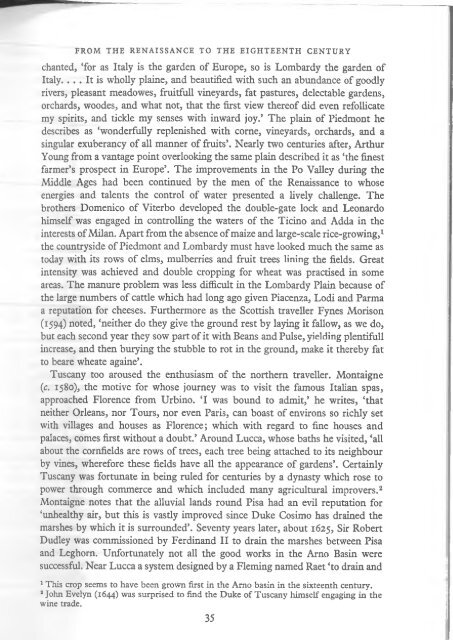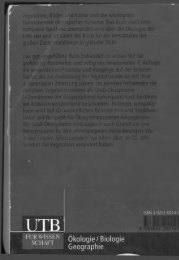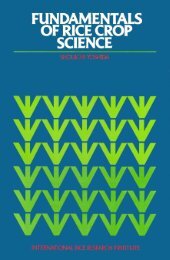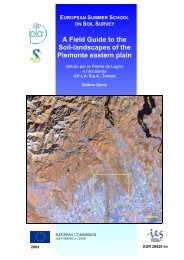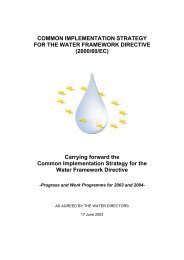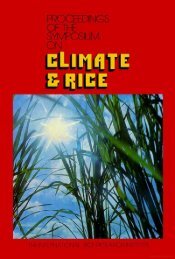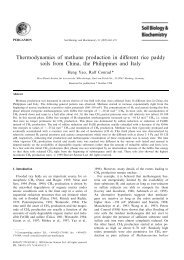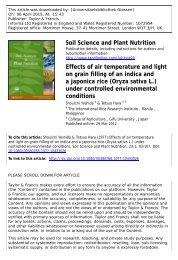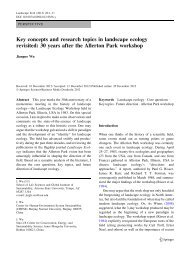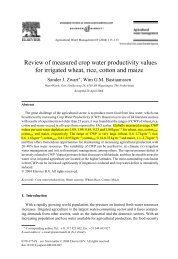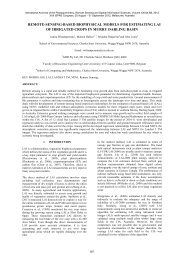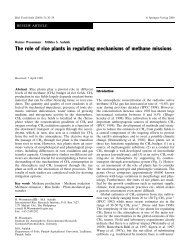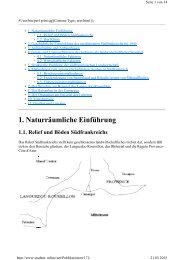Walker - 1967 - A geography of Italy
Walker - 1967 - A geography of Italy
Walker - 1967 - A geography of Italy
Create successful ePaper yourself
Turn your PDF publications into a flip-book with our unique Google optimized e-Paper software.
FROM THE RENAISSANCE TO THE EIGHTEENTH CENTURY<br />
chanted, ‘for as <strong>Italy</strong> is the garden o f Europe, so is Lombardy the garden <strong>of</strong><br />
<strong>Italy</strong>. . . . It is wholly plaine, and beautified with such an abundance o f goodly<br />
rivers, pleasant meadowes, fruitfull vineyards, fat pastures, delectable gardens,<br />
orchards, woodes, and what not, that the first view there<strong>of</strong> did even refollicate<br />
my spirits, and tickle my senses with inward joy.’ The plain o f Piedmont he<br />
describes as ‘wonderfully replenished with come, vineyards, orchards, and a<br />
singular exuberancy o f all manner o f fruits’. Nearly two centuries after, Arthur<br />
Young from a vantage point overlooking the same plain described it as ‘the finest<br />
farmer’s prospect in Europe’. The improvements in the Po Valley during the<br />
Middle Ages had been continued by the men o f the Renaissance to whose<br />
energies and talents the control o f water presented a lively challenge. The<br />
brothers Domenico o f Viterbo developed the double-gate lock and Leonardo<br />
himself was engaged in controlling the waters o f the Ticino and Adda in the<br />
interests o f Milan. Apart from the absence o f maize and large-scale rice-growing,^<br />
the countryside o f Piedmont and Lombardy must have looked much the same as<br />
today with its rows o f elms, mulberries and fruit trees lining the fields. Great<br />
intensity was achieved and double cropping for wheat was practised in some<br />
areas. The manure problem was less difficult in the Lombardy Plain because o f<br />
the large numbers o f cattle which had long ago given Piacenza, Lodi and Parma<br />
a reputation for cheeses. Furthermore as the Scottish traveller Fynes Morison<br />
(1594) noted, ‘neither do they give the ground rest by laying it fallow, as we do,<br />
but each second year they sow part o f it with Beans and Pulse, yielding plentifull<br />
increase, and then burying the stubble to rot in the ground, make it thereby fat<br />
to beare wheate againe’.<br />
Tuscany too aroused the enthusiasm o f the northern traveller. Montaigne<br />
(c. 1580), the motive for whose journey was to visit the famous ItaUan spas,<br />
approached Florence from Urbino. ‘I was bound to admit,’ he writes, ‘that<br />
neither Orleans, nor Tours, nor even Paris, can boast o f environs so richly set<br />
with villages and houses as Florence; which with regard to fine houses and<br />
palaces, comes first without a doubt.’ Around Lucca, whose baths he visited, ‘all<br />
about the cornfields are rows o f trees, each tree being attached to its neighbour<br />
by vines, wherefore these fields have all the appearance o f gardens’. Certainly<br />
Tuscany was forttmate in being ruled for centuries by a dynasty which rose to<br />
power through commerce and which included many agricultural improvers.^<br />
Montaigne notes that the alluvial lands round Pisa had an evil reputation for<br />
‘unhealthy air, but this is vastly improved since Duke Cosimo has drained the<br />
marshes by which it is surroimded’. Seventy years later, about 1625, Sir Robert<br />
Dudley was commissioned by Ferdinand II to drain the marshes between Pisa<br />
and Leghorn. Unfortunately not all the good works in the Arno Basin were<br />
successful. Near Lucca a system designed by a Fleming named Raet ‘to drain and<br />
' This crop seems to have been grown first in the Amo basin in the sixteenth century.<br />
’ John Evelyn (1644) was surprised to find the Duke <strong>of</strong> Tuscany himself engaging in the<br />
wine trade.<br />
35


